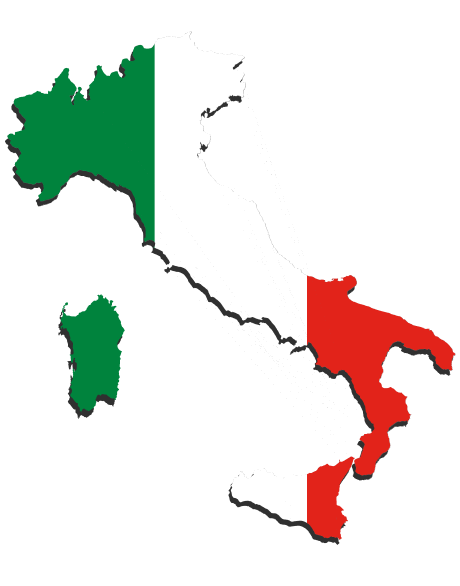Population
GDP (per capital)
Visa-Free Countries
GDP (purchasing power parity)
-
The Italian Golden Visa
-
Investment immigration to Italy offers high-net-worth individuals a unique pathway to secure residency or citizenship through financial contributions. This attractive option allows investors to not only gain access to Italy’s rich culture, lifestyle, and European Union benefits but also to capitalize on the country’s robust economic opportunities. Italy’s strategic location, favorable tax incentives, and booming real estate and business sectors make it an appealing choice for those looking to expand their international footprint while enjoying a high quality of life in one of Europe’s most prestigious countries.
- Main Industries
- Tourism and Hospitality
- Automotive and Machinery
- Fashion and Textile Manufacturing
- Food and Beverage Production
- Chemical and Pharmaceutical Industry
- Furniture and Interior Design

UTC+1
301,340 km2
Euro (EUR)
Rome
Italian

-
2025 updates
- In 2025, Italy introduced several updates to its investment immigration policies, making the country even more attractive to foreign investors. The minimum investment thresholds for the Golden Visa have been slightly adjusted, offering more flexible options in sectors like technology and green energy. Additionally, the Start-Up Visa now includes enhanced support for innovative ventures, especially in sustainable industries. Italy has also streamlined the application process, reducing waiting times for residency approval, while expanding incentives for investors contributing to local economic recovery post-pandemic. These changes reflect Italy’s growing commitment to attracting international talent and capital.
-
Key Investment Programs for Immigration to Italy
-
Italy’s investment immigration programs offer a prime opportunity for high-net-worth individuals to gain residency and potentially citizenship. The Golden Visa is one of the most sought-after routes for investors.
Golden Visa (Investor Visa for Italy)
Golden Visa (Investor Visa for Italy)
Eligibility
Applicants must invest a minimum amount in Italy. The key options are:
- Real Estate: At least €500,000 in property (or €250,000 in certain areas).
- Business Investment: Minimum €500,000 in an Italian company or start-up.
- Government Bonds: Minimum €2 million invested in Italian government bonds.
- Philanthropy: Donations of at least €1 million to an Italian non-profit organization or cultural project.
Investment Options
Investors can choose from real estate, business ventures, government bonds, or philanthropic donations. Each of these provides a pathway to residency and helps contribute to Italy’s economy.
Benefits
The Golden Visa offers residency for the investor and their immediate family, with a pathway to citizenship after 10 years of residency. Family reunification is also allowed, giving spouses and dependent children the right to join the investor.
2025 Updates
In 2025, Italy revised investment thresholds, particularly for emerging sectors like green energy and technology, aiming to attract innovation. Processing times have been reduced, and there are additional incentives for investors involved in sustainable development projects.
Start-Up Visa
Start-Up Visa
The Start-Up Visa is designed for entrepreneurs who are eager to launch innovative start-ups in Italy, particularly those in sectors like technology, green energy, and sustainability.
Eligibility
This visa is available to non-EU nationals who wish to establish a start-up with high growth potential. Applicants must demonstrate that their business idea is innovative and can contribute to Italy’s economic development.
Investment Requirements
Entrepreneurs must secure a minimum investment of €50,000 for the start-up, with additional requirements to create jobs and ensure the company’s sustainability. This investment can come from the entrepreneur’s personal funds or external investors.
Process & Benefits
The process involves obtaining approval from the Italian Ministry of Economic Development (MISE), who evaluates the start-up’s viability. The visa allows entrepreneurs to reside in Italy while managing their business. After two years, entrepreneurs can apply for long-term residency, with the possibility of citizenship after five years. The visa offers significant benefits, including access to Italy’s vibrant business ecosystem, talent pool, and EU markets.
Investor Visa for Innovative Start-Ups
Investor Visa for Innovative Start-Ups
The Investor Visa for Innovative Start-Ups offers a unique opportunity for entrepreneurs and investors seeking to fund cutting-edge tech ventures and projects within Italy’s thriving innovation landscape.
Eligibility
This visa is tailored for individuals or entities investing in innovative start-ups, particularly those focused on emerging technologies, sustainability, and digital innovation. Applicants must show a clear commitment to fostering business growth in Italy through substantial financial backing and innovation.
Investment Criteria
Investors must contribute a minimum of €250,000 to an Italian start-up, with the requirement that the start-up demonstrates significant innovation, scalability, and job creation potential. This funding should align with Italy’s focus on advancing high-tech and sustainable industries.
Benefits
Holders of the Investor Visa for Innovative Start-Ups benefit from several advantages, including access to Italy’s supportive start-up ecosystem and opportunities for tax incentives. Additionally, the visa offers a pathway to permanent residency after five years, with the potential for citizenship, making it a highly attractive option for investors seeking to establish a long-term presence in Europe.
Advantages of Investing in Italy
Investing in Italy presents a compelling opportunity for individuals seeking both financial growth and a high quality of life. The country offers numerous advantages, making it an increasingly attractive destination for foreign investors.
Economic Stability & Opportunities:
Following the economic recovery post-COVID, Italy has emerged as a stable hub within Europe, with new opportunities arising in cutting-edge sectors such as technology, green energy, and digital innovation. As part of the European Union, Italy provides investors with access to a large and dynamic market, along with the advantages of EU regulations and trade agreements.
Tax Benefits:
Italy offers several tax incentives to attract foreign investment. These include favorable conditions for start-ups and innovative businesses, such as tax credits and reduced rates for specific sectors, especially tech and sustainability. Additionally, Italy’s tax system presents opportunities for wealthy investors to optimize their financial strategies.
Quality of Life & Access to Europe:
Italy’s renowned lifestyle—marked by its rich culture, excellent cuisine, and beautiful landscapes—is complemented by top-tier healthcare and education systems. Investors can enjoy the comfort of high-quality services, while Italy’s strategic location offers easy access to other European countries, enhancing both personal and professional mobility.
Family & Education:
One of the key advantages of investment immigration is the ability to bring immediate family members to Italy. This opens doors to quality education and healthcare for dependents, ensuring a smooth transition to life in one of Europe’s most vibrant countries. Additionally, Italy’s world-class universities provide children with exceptional academic opportunities.
-
Key Considerations & Challenges
- While investment immigration to Italy offers numerous benefits, there are several important factors and potential challenges that applicants should carefully consider before proceeding.

- Costs and Fees: The application for an Investor Visa involves various expenses. These include government application fees (ranging from €150 to €2,000, depending on the investment type), legal fees for assistance with documentation and submission, and administrative costs for residency registration. Additionally, investors should consider costs related to their investment, such as property purchase taxes, or any fees associated with establishing a business or making philanthropic donations.
- Economic Risks: As with any investment, there are risks involved. Fluctuations in the real estate market or shifts in the business environment could impact the value of your investment. Changes in Italy's economic conditions, both locally and as part of the broader EU market, could also affect profitability. Investors in start-ups, in particular, should be aware of the inherent risks in new ventures, including market volatility and business sustainability challenges.
- Long-Term Residency and Citizenship: Gaining permanent residency in Italy typically requires five years of legal residence, during which the investor must maintain their investment. After this period, investors can apply for citizenship through naturalization, provided they meet all necessary requirements, including language proficiency. While the process is straightforward for many, it can take up to 10 years to gain full citizenship. Therefore, it's essential for investors to plan for long-term commitment to Italy, ensuring they meet residency obligations and maintain their investments.
-
Application Process and Requirements
- Applying for an Investor Visa in Italy involves a clear process with specific financial and documentation requirements. Below is an overview to guide potential applicants through each stage.
- Step-by-Step Guide: The application begins with gathering essential documents, including proof of identity, investment plans, and financial records. Once prepared, the applicant submits an online application to the Italian Ministry of Foreign Affairs, including a detailed business or investment proposal. After submission, the authorities review the documents and, if approved, issue the visa. Upon arrival in Italy, investors must complete the residency registration process.
- Financial Requirements: Applicants must meet certain financial thresholds depending on the chosen investment option. For example, a minimum investment of €500,000 in real estate or €250,000 in a start-up is required. Documentation to prove the source of funds is essential, along with a comprehensive investment plan detailing how the capital will be deployed.
- Processing Times: The typical processing time for an Investor Visa is around 2 to 3 months, though this can vary depending on the complexity of the investment and the applicant’s background. In some cases, Italy offers fast-track processing for applicants in certain industries or with significant investments, which can expedite the approval process.
- Language & Residency Requirements: While there is no language requirement for investors, applicants must demonstrate the intention to reside in Italy. Exemptions to certain residency criteria may apply, particularly for those investing in highly innovative or sustainable sectors, which are seen as beneficial to the local economy.
Recent Developments in 2025
Recent Developments in 2025
Italy’s investment immigration landscape has seen notable changes in 2025, reflecting the country’s commitment to fostering economic growth, innovation, and sustainability. These updates aim to make Italy an even more attractive destination for high-net-worth individuals seeking residency through investment.
Policy Changes
In response to evolving global economic trends, Italy has revised several aspects of its investment immigration programs. Investment thresholds have been adjusted, with lower amounts now required for certain sectors, making it more accessible for entrepreneurs and investors. Additionally, processing times have been streamlined, with many applicants benefiting from faster approval through expedited channels, especially for tech and green energy investments. New visa options have also been introduced, such as a specialized program for investors contributing to sustainable infrastructure projects, reinforcing Italy's commitment to environmental and economic advancement.
Post-Pandemic Economic Focus
Italy's post-COVID recovery strategy includes a strong emphasis on attracting foreign investment in sectors critical to the nation’s long-term growth, such as technology, green energy, and infrastructure development. The government is actively promoting investment in these areas by offering enhanced incentives, tax breaks, and subsidies, positioning Italy as a hub for innovation and sustainability. These initiatives are designed not only to boost Italy’s economy but also to solidify its position as a key player in the European Union’s green transition and digital transformation.
Conclusion
In conclusion, Italy’s investment immigration programs offer a unique and compelling opportunity for high-net-worth individuals seeking both financial growth and a high quality of life. With the recent updates in 2025, including revised investment thresholds and expedited processing times, Italy continues to enhance its appeal as a destination for foreign investors. The country’s focus on emerging sectors like technology and green energy, combined with its strategic position within the EU, makes it an attractive choice for those looking to make a lasting impact in a thriving economy. Whether through the Golden Visa, Start-Up Visa, or other investment pathways, Italy provides a welcoming environment for those looking to contribute to its economic future while enjoying the benefits of residency, family reunification, and a high standard of living.
Looking for expert visa support?
PROGRAM MATCH
Compare the different programs in a nutshell and discover their features
PROGRAM COST
Check the cost estimates for each offered program
PROGRAM MAP
Explore the power of global mobility for every passport in the world
